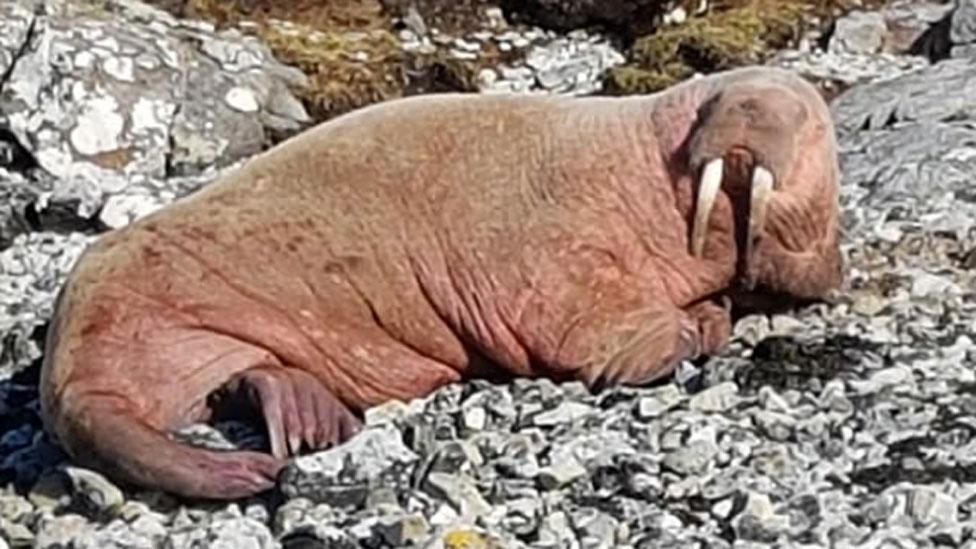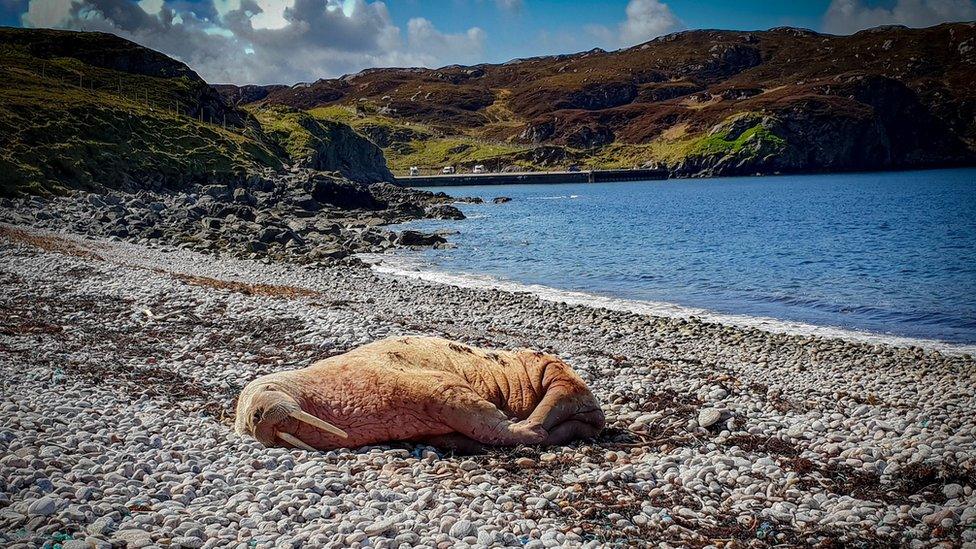Arctic walrus off Ireland's coast proves a rare sighting
- Published
Arctic walrus spotted off County Kerry coast
A walrus spotted on rocks in Ireland's County Kerry is likely to be an adolescent that left the Arctic in search of new breeding grounds and food, according to an expert.
The rare sighting was captured by a local man and his five-year-old daughter on Sunday.
On Monday, observers said there were no signs of the animal in the area.
While such sightings are unusual, an adult walrus was seen on the north and west coast of Scotland in 2018.
Tom Arnbom, a senior advisor to WWF on the Arctic and its marine life, told BBC News that the latest walrus looked relatively young. "Often it is adolescent animals that venture on long trips" to find new areas to breed, he explained.
Alan Houlihan told Irish media he and his daughter Muireann spotted the mammal on Valentia Island when they were out walking at the weekend.
"The size of the thing was astronomical. It was the size of a big bull," he said.
"He disappeared into the sea for a while and he then came back and put himself on a rock for a good couple of hours. It was fantastic."
Allow Facebook content?
This article contains content provided by Facebook. We ask for your permission before anything is loaded, as they may be using cookies and other technologies. You may want to read Meta’s Facebook cookie policy, external and privacy policy, external before accepting. To view this content choose ‘accept and continue’.

Marine biologist Kevin Flannery of Dingle Oceanworld Aquarium told the Irish Examiner: "This is the first confirmed sighting of a walrus. It's a one-off as far as I'm concerned."
The Irish Whale and Dolphin group (IWDG) believe it is the third sighting of a walrus since 1999.
Mr Flannery suggested that the mammal probably fell asleep on an iceberg in Greenland and woke up off the coast of Ireland.
However, Mr Arnbom believes that is unlikely. Instead the walrus probably deliberately veered far from home in the North Atlantic and came close to the Irish coast to find food, he says.
"Sooner or later they have to come to the shallows, i.e. less than 100-200 metres depth, to feed on mussels or clams. They eat up to several thousand clams a day," he explained.
"It is lost while it is far from any friends, but I am not afraid that it will die," Mr Arnbom explains, adding that the walrus does not appear sick in the photographs.
He says the animal will hopefully find its way home, but not before it is sighted in several other places.
It is very important that humans do not get close to walruses otherwise they may get scared and try to reach the shore, endangering them, he explained. "They are big wild animals so keep a distance."
There are about 20,000 walruses in the North Atlantic, but globally they are facing a growing threat from climate change and shipping routes, Mr Arnbom said.
He added that these issues had killed thousands of the mammals in the Pacific Ocean, close to Alaska and north-eastern Russia. But in the Atlantic, walruses seem better able to cope with a changing climate because feeding grounds are closer to shore and they rest in smaller groups.

You might want to watch:
The 'ghost ship' washed up off the coast of Cork
Related topics
- Published3 May 2018

- Published22 May 2018
